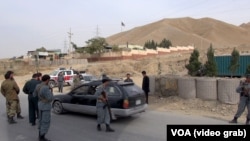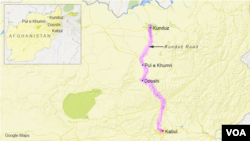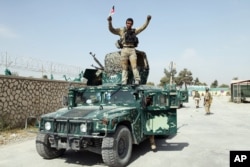A government-appointed fact-finding commission in Afghanistan has blamed leadership failure at the central and provincial levels, along with presence of illegal militias, and flaws in judicial and security institutions for the short-lived fall of the key northern city of Kunduz to the Taliban in September.
The six-member commission of prominent private Afghan individuals released findings of its month-long probe at a news conference in Kabul Saturday.
The investigation was authorized by Afghan President Ashraf Ghani shortly after national security forces retook control of most of the provincial capital with the help of American air support.
Short-lived setback
The battlefield setback, though short-lived, was seen as a significant blow to U.S.-trained Afghan forces’ readiness to sustain the counter-insurgency campaign after a reduction of U.S. forces.
Mohammad Ayub Rafiqi, a commission member, while discussing factors that led to the Kunduz crisis, urged the Ghani government to deliver on its commitments of good governance to prevent such incidents in future.
"Illegal political interference particularly by parliamentarians in the official matters, institutional disorder, corruption, judicial weaknesses, ghost police and security forces and failure of the Afghan government to reign in thousands of illegal armed men paved the ground for the Taliban takeover of the Kunduz," Rafiqi said
Anti-government sentiment
He went on to say that while rampant poverty and unemployment were fueling anti-government sentiments among the residents, authorities did nothing to tackle long-running “land-grabbing mafia and hundreds of armed groups” undermining civilian lives, dignity and property.
According to the commission’s findings, Taliban fighters, during their three-day control of Kunduz, seized important documents from the Afghan intelligence office there and stole up to 40 armored and other military vehicles.
The findings of the Afghan commission are likely to fuel criticism of Present Ashraf Ghani’s national unity government in the wake of deteriorating security across the country that is prompting many citizens to flee Afghanistan.
Former Afghan spy chief, Amrullah Saleh, head of the fact-finding commission, told reporters that during the course of their probe members were shown “material evidence” – including communication intercepts gathered by the national intelligence agency – that suggested Taliban insurgents were being directed and advised by their “advisers” in neighboring Pakistan.
Afghan military officials leveled similar allegations at the time of the Kunduz fighting but the Pakistan government promptly rejected them.
Government reaction
Syad Zafar Hashemi, a presidential spokesman commenting on the commission’s findings, told reporters the government has already initiated actions on some of the recommendations and shortcomings identified in the report.
Hashemi did not elaborate but said the steps are being taken in close consultation with male and female leaders representing the people of Kunduz.
The Taliban’s unexpected advance on the city prompted President Barack Obama in mid-October to slow down a planned military withdrawal from the country. He said that the United States would maintain a force of around 10,000 in Afghanistan through most of 2016.
Saleh said that commission members determined that crucial American air support prevented the insurgents from capturing the Kunduz airport and ultimately helped local forces in driving the Taliban out of the city.
But he did not mention what led to a U.S. air attack on a hospital in Kunduz run by the international charity Doctors Without Borders (MSF), in which 30 people, including doctors and patients, were killed.
The U.S., NATO and the Afghan government are conducting separate probes into the hospital attack but they have yet to release their findings, more than six weeks after the deadly raid that destroyed the only medical facility in Kunduz.






